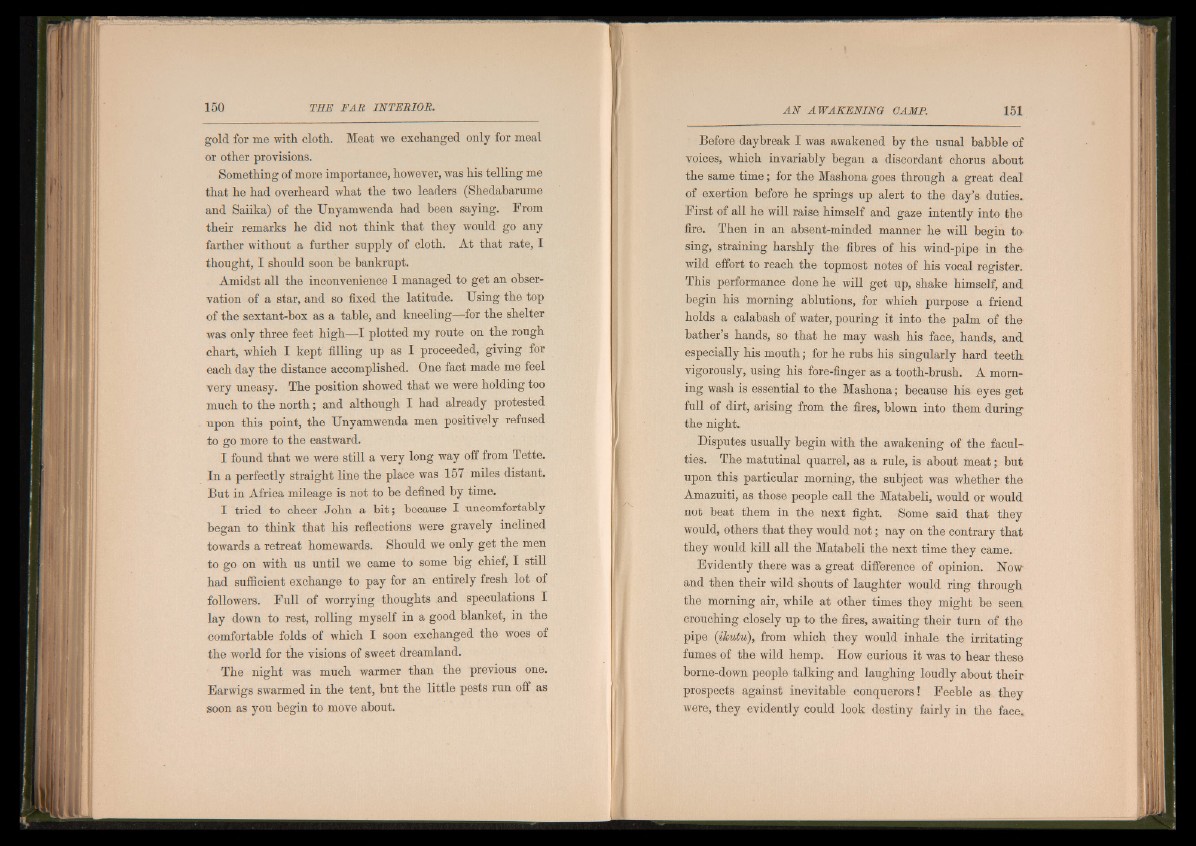
gold for me with cloth. Meat we exchanged only for meal
or other provisions.
Something of more importance, however, was his telling me
that he had overheard what the two leaders (Shedabarume
and Saiika) of the Unyamwenda had been saying. From
their remarks he did not think that they would go any
farther without a further supply of cloth. At that rate, I
thought, I should soon be bankrupt.
Amidst, all the inconvenience I managed to get an observation
of a star, and so fixed the latitude. Using the top
of the sextant-box as a table, and kneeling—for the shelter
was only three feet high—I plotted my route on the rough
chart, which I kept filling up as I proceeded, giving for
each day the distance accomplished. One fact made me feel
very uneasy. The position showed that we were holding too
much to the north; and although I had already protested
upon this point, the Unyamwenda men positively refused
to go more to the eastward.
I found that we were still a very long way off from Tette.
In a perfectly straight line the place was 157 miles distant.
But in Africa mileage is not to be defined by time.
I tried to cheer John a b it; because I uncomfortably
began to think that his reflections were gravely inclined
towards a retreat homewards. Should we only get the men
to go on with us until we came to some big chief, I still
had sufficient exchange to pay for an entirely fresh lot of
followers. Full of worrying thoughts and speculations I
lay down to rest, rolling myself in a good blanket, in the
comfortable folds of which I soon exchanged the woes of
the world for the visions of sweet dreamland.
The night was much warmer than the previous one.
Earwigs swarmed in the tent, but the little pests run off as
soon as you begin to move about.
Before daybreak I was awakened by the usual babble of
voices, which invariably began a discordant chorus about
the same time; for the Mashona goes through a great deal
of exertion before he springs up alert to the day’s duties.
First of all he will raise himself and gaze intently into the
fire. Then in an absent-minded manner he will begin to-
sing, straining harshly the fibres of his wind-pipe in the
wild effort to reach the topmost notes of his vocal register.
This performance done he will get up, shake himself, and
begin his morning ablutions, for which purpose a friend
holds a calabash of water, pouring it into the palm of the
bather’s hands, so that he may wash his face, hands, and
especially his mouth; for he rubs his singularly hard teeth
vigorously, using his fore-finger as a tooth-brush. A morning
wash is essential to the Mashona; because his eyes get
full of dirt, arising from the fires, blown into them during-
the night.
Disputes usually begin with the awakening of the faculties.
The matutinal quarrel, as a rule, is about meat; but
upon this particular morning, the subject was whether the
Amazuiti, as those people call the Matabeli, would or would
not beat them in the next fight. Some said that they
would, others that they would n o t; nay on the contrary that
they would kill all the Matabeli the next time they came.
Evidently there was a great difference of opinion. Now
and then their wild shouts of laughter would ring through
the morning air, while at other times they might be seen
crouching closely up to the fires, awaiting their turn of the
pipe (iJcutu), from which they would inhale the irritating
fumes of the wild hemp. How curious it was to hear these
borne-down people talking and laughing loudly about their
prospects against inevitable conquerors! Feeble as they
were, they evidently could look destiny fairly in the face.